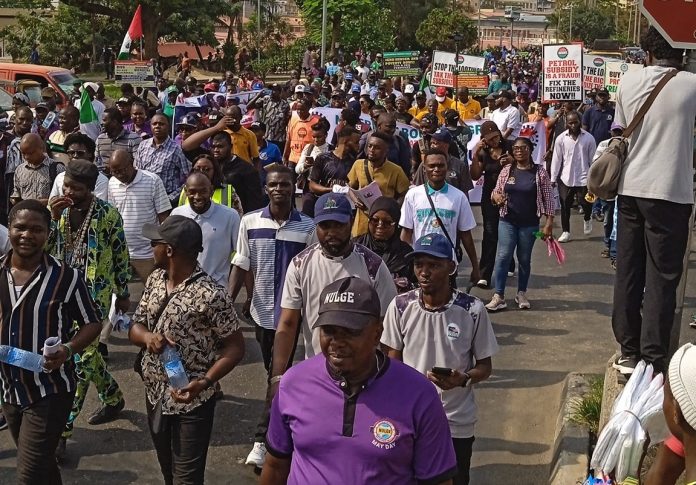Deji Olayinka
Since Nigerian president Bola Tinubu came to power last May, he has launched relentless attacks on the masses in Nigeria through neoliberal capitalist ‘shock therapy’ policies, encouraged by the International Monetary Fund (IMF) and international capitalists.
This started with the immediate removal of fuel subsidies, sharply increasing the cost of transport and energy generation. He then floated the Nigerian currency, more than doubling the price of imports as the naira lost 70% of its value. The resultant inflation has escalated the crisis of underfunding in government services; for example in healthcare antibiotics prices increased by 1,100%.
Inflation has worsened hunger; the ministry of agriculture predicts that 31.5 million Nigerians will face acute hunger this year and many are now turning to eating reject rice grains previously used for fish feed. Domestic food growth has also been hindered by kidnapping and attacks by terrorists and violent gangs. Insecurity has only worsened since the inflation with more desperate acts like the recent looting of a warehouse and a stampede over rice killing seven people. With 46 academics in the capital dying due to hardship, it’s clear even traditionally secure professions aren’t immune to the suffering.
To fight back, there have been spontaneous protests, but organised workers should lead the movement. The Nigerian Labour Congress called two days of protests but cancelled the second day, despite getting no concessions from the government. The Democratic Socialist Movement of Nigeria (DSM) – the Socialist Party’s sister party – called for national strike action from the unions. If organised, this could force a reversal of policy, as was seen in the 2011 general strike in Nigeria.
But regardless of the trade union leadership’s inaction, the DSM, as part of the Joint Action Force, has vowed to continue action, despite the constant threat of violent repression by the Nigerian state.
And so solidarity action must also be taken by the Nigerian diaspora. Here, the Socialist Party, as part of Nigeria Solidarity UK, quickly organised a demonstration outside the Nigerian High Commission in London on 9 March, as a step towards building a solidarity movement of Nigerians and other workers.
The campaign echoes the calls of the DSM for an immediate end to Tinubu’s anti-poor policies. It calls for the return of the fuel subsidy to lower prices back to pre-29 May levels, for an increase in the national minimum wage to match the rate of inflation, and for a reversal of all anti-poor neoliberal policies. Nigeria has huge resources, yet they are used for the greed of a few. Join us as we campaign for them to be used for the benefit of the majority.
We are also campaigning on the issues affecting Nigerians here in Britain. The rapid devaluation of the naira left many students threatened with unenrolment as they were unable to pay their university fees which basically doubled overnight. Over the coming weeks we will be organising protests and meetings on campuses demanding that universities write off the increased burden of uni fees and accommodation costs caused by the devaluation of the naira.
Nigeria Solidarity UK Zoom meeting: Speakers include Peloala Adewale Democratic Socialist Movement Nigeria
- 7pm 25 March 2024
- Meeting ID: 815 4306 7850 Passcode: 521693. All welcome







